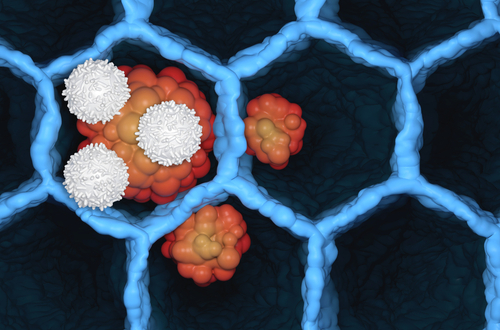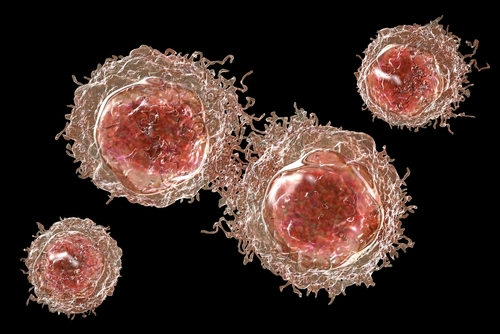
Chemotherapy-induced myelosuppression (CIM) is a common complication among cancer patients undergoing myelotoxic chemotherapy, but the burden of CIM among patients with extensive-stage SCLC (ES-SCLC) and their caregivers is poorly understood. Results of a study that aimed to describe patient- and caregiver-perceived burden of CIM in a real-world setting were presented at the 2023 North America Conference on Lung Cancer.
The researchers conducted a cross-sectional, web-based survey of US adults who were either patients with ES-SCLC who received chemotherapy within the past 12 months and experienced myelosuppression or adults identifying as the caregivers for such patients. Respondents were queried about CIM-related experiences; psychological and functional status, as measured by the FACT-L instrument; chemotherapy regimen changes and associated psychological distress; and time spent on CIM care. A total of 110 patients with ES-SCLC (mean age, 60 years; 30.9% female; 58.2% White) and 24 caregivers (median age, 44 years; 50.0% female; 62.5% White; 83.3% identified as a child or spouse/partner) completed the survey. Most (80.9%) patients received chemotherapy within the last 2 months.
Results showed that overall, 93.6% of patients reported CIM-attributable symptoms or complications and 95.5% of patients reported receiving treatment for myelosuppression. The researchers found cytopenia rates were 60.0%, 56.4%, and 44.5% for neutropenia, anemia, and thrombocytopenia, respectively. The severe infection rate was 15.5%. In addition, patients commonly reported bleeding events (24.5%), infection events or symptoms (52.7%), and signs or symptoms of anemia (63.6%).
Further, patients reported several psychological impacts associated with their CIM, such as loneliness (40.9%), isolation (32.7%), and disconnection (37.3%). Caregivers reported similar psychological impacts associated with their patients’ CIM. Chemotherapy regimens were changed due to CIM for 53 (39.6%) patients. Both patients and caregivers reported significant stress (47.5% and 77.0%, respectively), worry (52.5% and 77.0%, respectively), and anxiety (47.5% and 84.6%, respectively) related to these changes. Around 41% of patients and 31% of caregivers reported the time spent for needed CIM care each week as “extremely or very bothersome.”
In conclusion, the researchers said, “The burden associated with CIM experienced by ES-SCLC patients and their caregivers is substantial. Clinical decision-making and management should reflect the experiences and perceptions of real-world burden associated with CIM among patients with ES-SCLC and their caregivers.”
Source: Abraham I, Zincavage R, Ito D, et al. Burden of chemotherapy-induced myelosuppression on patients with extensive-stage small cell lung cancer (ES-SCLC) from the perspective of patients and caregivers. Abstract of a poster presented at the 2023 North America Conference on Lung Cancer; December 1-3, 2023; Chicago, Illinois.







 © 2025 Mashup Media, LLC, a Formedics Property. All Rights Reserved.
© 2025 Mashup Media, LLC, a Formedics Property. All Rights Reserved.